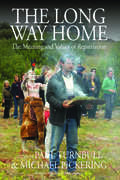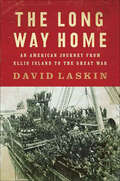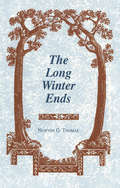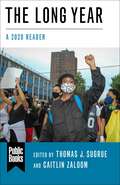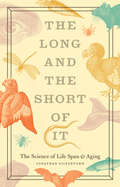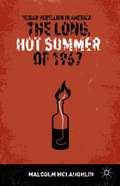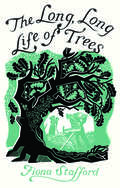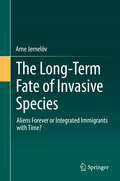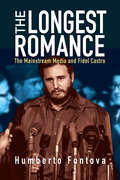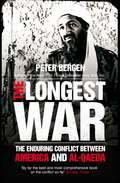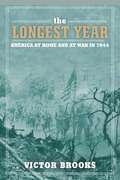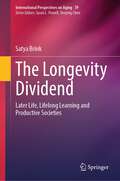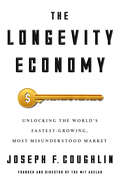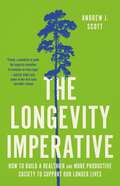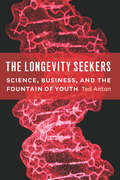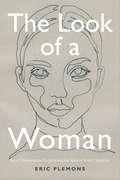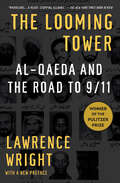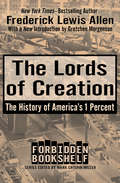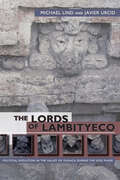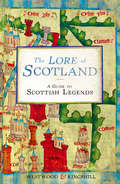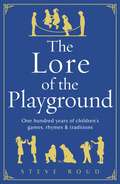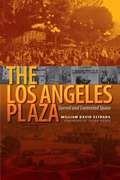- Table View
- List View
The Long Way Home
by Michael Pickering Paul TurnbullIndigenous peoples have long sought the return of ancestral human remains and associated artifacts from western museums and scientific institutions. Since the late 1970s their efforts have led museum curators and researchers to re-evaluate their practices and policies in respect to the scientific uses of human remains. New partnerships have been established between cultural and scientific institutions and indigenous communities. Human remains and culturally significant objects have been returned to the care of indigenous communities, although the fate of bones and burial artifacts in numerous collections remains unresolved and, in some instances, the subject of controversy. In this book, leading researchers from a wide range of disciplines in the humanities and social sciences reflect critically on the historical, cultural, ethical and scientific dimensions of repatriation. Through various case studies they consider the impact of repatriation: what have been the benefits, and in what ways has repatriation given rise to new problems for indigenous people, scientists and museum personnel. It features chapters by indigenous knowledge custodians, who reflect upon recent debates and interaction between indigenous people and researchers in disciplines with direct interests in the continued scientific preservation of human remains. In this book, leading researchers from a wide range of disciplines in the humanities and social sciences reflect critically on the historical, cultural, ethical and scientific dimensions of repatriation. Through various case studies they consider the impact of repatriation: what have been the benefits, and in what ways has repatriation given rise to new problems for indigenous people, scientists and museum personnel. It features chapters by indigenous knowledge custodians, who reflect upon recent debates and interaction between indigenous people and researchers in disciplines with direct interests in the continued scientific preservation of human remains.
The Long Way Home: An American Journey from Ellis Island to the Great War
by David Laskin“Moving, revealing, and lovingly researched, this book is a must read, and a great read, for any of us whose forebears came from overseas—meaning just about all of us.” — Erik LarsonThe author of the award-winning The Children’s Blizzard, David Laskin, returns with a remarkable true story of the immigrants who risked their lives fighting for America during the Great War.In The Long Way Home, award-winning writer David Laskin traces the lives of a dozen men who left their childhood homes in Europe, journeyed through Ellis Island, and started over in a strange land—only to cross the Atlantic again in uniform when their adopted country entered the Great War.Though they had known little of America outside of tight-knit ghettos and backbreaking labor, these foreign-born conscripts were rapidly transformed into soldiers, American soldiers, in the ordeal of war. Two of the men in this book won the Medal of Honor. Three died in combat. Those who survived were profoundly altered–and their heroic service reshaped their families and ultimately the nation itself.Epic, inspiring, and masterfully written, this book is an unforgettable true story of the Great War, the world it remade, and the humble, loyal men who became Americans by fighting for America.
The Long Winter Ends: Long Winter Ends
by Newton G. ThomasThe Long Winter Ends tells the story of a year in the life of a young emigrant miner who leaves Cornwall in the southwest of England to work in the copper mines of Michigan's Upper Peninsula.
The Long Year: A 2020 Reader (Public Books Series)
by Eric Klinenberg Joan Wallach Scott Julie Livingston Natalia Molina Jun Li Guobin Yang Andrew Lakoff Priscilla Wald Warwick Anderson Warren Breckman Adam Tooze Ananya Roy Sophie Lewis Neha Vora Margaret O'Mara Yarimar Bonilla Merlin Chowkwanyun Keeanga-Yamahtta Taylor Margaret Morganroth Gullette Marcia Chatelain Jacob A.C. Remes Joanne Randa Nucho Xiaowei Wang Miguel Centeno Jean-Paul Gagnon Keisha N. Blain Sulfikar Amir Mustafa Dikeç David Schmidt Gautam Bhan David S. Barnes Isabelle Guérin Andy Horowitz Simon Balto Éric Charmes Max Rousseau Michelle Cera Gilles Guiheux Ye Guo Renyou Hou Manon Laurent Anne-Valérie Ruinet Govindan Venkatasubramanian Mathieu Ferry Marine Al Dahdah Sherihan Radi Jeffrey Aaron Snyder Rachel Nolan Evan Lieberman Julia Foulkes Soledad Álvarez Velasco Sophie Gonick Alfonso Fierro Erick Corrêa Gianpaolo Biaocchi Jake Carlson Quentin Ravelli Rikki J. Dean Afsoun Afsahi Emily Beausoleil Selen A. Ercan Cordula Dittmer Daniel F. Lorenz Kathryn Cai Kavita SivaramakrishnanSome years—1789, 1929, 1989—change the world suddenly. Or do they? In 2020, a pandemic converged with an economic collapse, inequalities exploded, and institutions weakened. Yet these crises sprang not from new risks but from known dangers. The world—like many patients—met 2020 with a host of preexisting conditions, which together tilted the odds toward disaster. Perhaps 2020 wasn’t the year the world changed; perhaps it was simply the moment the world finally understood its deadly diagnosis.In The Long Year, some of the world’s most incisive thinkers excavate 2020’s buried crises, revealing how they must be confronted in order to achieve a more equal future. Keeanga-Yamahtta Taylor calls for the defunding of police and the refunding of communities; Keisha Blain demonstrates why the battle against racism must be global; and Adam Tooze reveals that COVID-19 hit hardest where inequality was already greatest and welfare states weakest. Yarimar Bonilla, Xiaowei Wang, Simon Balto, Marcia Chatelain, Gautam Bhan, Ananya Roy, and others offer insights from the factory farms of China to the elite resorts of France, the meatpacking plants of the Midwest to the overcrowded hospitals of India.The definitive guide to these ongoing catastrophes, The Long Year shows that only by exposing the roots and ramifications of 2020 can another such breakdown be prevented. It is made possible through institutional partnerships with Public Books and the Social Science Research Council.
The Long and the Short of It: The Science of Life Span and Aging
by Jonathan SilvertownEverything that lives will die. That's the fundamental fact of life. But not everyone dies at the same age: people vary wildly in their patterns of aging and their life spans--and that variation is nothing compared to what's found in other animal and plant species. A giant fungus found in Michigan has been alive since the Ice Age, while a dragonfly lives but four months, a mayfly half an hour. What accounts for these variations--and what can we learn from them that might help us understand, or better manage, our own aging? With The Long and the Short of It, biologist and writer Jonathan Silvertown offers readers a witty and fascinating tour through the scientific study of longevity and aging. Dividing his daunting subject by theme--death, life span, aging, heredity, evolution, and more--Silvertown draws on the latest scientific developments to paint a picture of what we know about how life span, senescence, and death vary within and across species. At every turn, he addresses fascinating questions that have far-reaching implications: What causes aging, and what determines the length of an individual life? What changes have caused the average human life span to increase so dramatically--fifteen minutes per hour--in the past two centuries? If evolution favors those who leave the most descendants, why haven't we evolved to be immortal? The answers to these puzzles and more emerge from close examination of the whole natural history of life span and aging, from fruit flies, nematodes, redwoods, and much more. The Long and the Short of It pairs a perpetually fascinating topic with a wholly engaging writer, and the result is a supremely accessible book that will reward curious readers of all ages.
The Long, Hot Summer Of 1967
by Malcolm MclaughlinIt seemed at times during the 1960s that America was caught in an unending cycle of violence and disorder. Successive summers from 1964-1968 brought waves of urban unrest, street fighting, looting, and arson to black communities in cities from Florida to Wisconsin, Maryland to California. In some infamous cases like Watts (1965), Newark (1967), and Detroit (1967), the turmoil lasted for days on end and left devastation in its wake: entire city blocks were reduced to burnt-out ruins and scores of people were killed or injured mainly by police officers and National Guardsmen as they battled to regain control. This book takes the pivotal year of 1967 as its focus and sets it in the context of the long, hot summers to provide new insights into the meaning of the riots and their legacy. It offers important new findings based on extensive original archival research, including never-before-seen, formerly embargoed and classified government documents and newly released official audio recordings.
The Long, Long Life of Trees
by Fiona StaffordA lyrical tribute to the diversity of trees, their physical beauty, their special characteristics and uses, and their ever-evolving meanings Since the beginnings of history trees have served humankind in countless useful ways, but our relationship with trees has many dimensions beyond mere practicality. Trees are so entwined with human experience that diverse species have inspired their own stories, myths, songs, poems, paintings, and spiritual meanings. Some have achieved status as religious, cultural, or national symbols. In this beautifully illustrated volume Fiona Stafford offers intimate, detailed explorations of seventeen common trees, from ash and apple to pine, oak, cypress, and willow. The author also pays homage to particular trees, such as the fabled Ankerwyke Yew, under which Henry VIII courted Anne Boleyn, and the spectacular cherry trees of Washington, D. C. Stafford discusses practical uses of wood past and present, tree diseases and environmental threats, and trees' potential contributions toward slowing global climate change. Brimming with unusual topics and intriguing facts, this book celebrates trees and their long, long lives as our inspiring and beloved natural companions.
The Long-Term Fate of Invasive Species
by Arne JernelövThis book examines the long-term fate of invasive species by detailing examples of invaders from different zoological and botanical taxa from various places around the world. Readers will discover what happened, after a century or so, to 'classical' invaders like rabbits in Australia, house sparrows in North America, minks in Europe and water hyacinths in Africa and Asia. Chapters presented in the book focus on eighteen species in the form of in-depth case studies including: earthworms, zebra mussels, Canadian water weed, Himalayan balsam, house sparrows, rabbits, crayfish plague, Colorado beetles, water hyacinths, starlings, Argentine ant, Dutch elm disease, American mink, cane toad, raccoons, Canadian beavers, African killer bees and warty comb jelly. Invaded areas described are in Africa, Asia, Australia, Europe, North America, Pacific islands, and South America. Readers will get some ideas about the likely future of current invaders from the fate of old ones. This book is intended for undergraduates studying environmental sciences, researchers and members of environmental NGO's.
The Longest Day: Celebrating the Summer Solstice
by Wendy PfefferIn this fourth and final book in the series about seasons, Wendy Pfeffer turns her attention to summer, when butterflies emerge from silky cocoons and daylight hours stretch longer and longer. With lyrical prose and vibrant illustrations, The Longest Day takes us on a journey through the history and science behind the summer solstice, with a focus on summer celebrations from various cultures around the world. Teachers and students alike will treasure the varied and accessible knowledge, and activities in the back let everyone in on the festivities.
The Longest Race: Inside the Secret World of Abuse, Doping, and Deception on Nike's Elite Running Team
by Kara GoucherIn this unvarnished and affecting memoir, Olympian Kara Goucher reveals her experience of living through and speaking out about one of the biggest scandals in running. <p><p>Kara Goucher grew up with Olympic dreams. She excelled at running from a young age and was offered a Nike sponsorship deal when she graduated from college. Then in 2004, she was invited to join a secretive, lavishly funded new team, dubbed the Nike Oregon Project. <p><p>Coached by distance running legend Alberto Salazar, it seemed like the opportunity of a lifetime. Kara was soon winning a World Championship medal, going to the Olympics, and standing on the podium at the New York and Boston marathons, just like her coach. But behind the scenes, Salazar was hiding dark secrets. He pushed the limits of anti-doping rules, and created what Kara experienced as a culture of abuse, the extent of which she reveals in her book for the first time. Meanwhile, Nike stood by Alberto for years and proved itself capable of shockingly misogynistic corporate practices. <p><p>Told with stunning honesty, The Longest Race is an unforgettable story and a call to action. Kara became a crusader for female athletes and a key witness helping to get Salazar banned from coaching at the Olympic level. Kara’s memoir reveals how she broke through the fear of losing everything, bucked powerful forces to take control of her life and career, and reclaimed her love of running. <p> <b>New York Times Bestseller</b>
The Longest Romance
by Humberto FontovaFidel Castro jailed political prisoners at a higher rate than Stalin during the Great Terror. He murdered more Cubans in his first three years in power than Hitler murdered Germans during his first six. Alone among world leaders, Castro came to within inches of igniting a global nuclear holocaust.But you would never guess any of that from reading the mainstream American media. Instead we hear fawning accounts of Castro liberating Cuba from the clutches of U.S. robber-barons and bestowing world-class healthcare and education on his downtrodden citizens. "Propaganda is vital-the heart of our struggle," Castro wrote in 1955. Today, the concept is as valid to the Cuban regime as ever.History records few propaganda campaigns as phenomenally successful or enduring as Castro and Che's. The Longest Romance exposes the full scope of this deception; it documents the complicity of major U.S. media players in spreading Castro's propaganda and in coloring the world's view of his totalitarian regime. Castro's cachet as a celebrity icon of anti-Americanism has always overshadowed his record as a warmonger, racist, sexist, Stalinist, and godfather of modern terrorism. The Longest Romance uncovers this shameful history and names its major accomplices.
The Longest War: The Enduring Conflict Between America and al-Qaeda
by Peter BergenIn The Longest War Peter Bergen offers a comprehensive history of the war on terror and its evolution, from the strategies devised in the wake of the 9/11 attacks to the fighting in Afghanistan, Pakistan, and beyond. Unlike any other book on this subject, Bergen tells the story of this shifting war's failures and successes from both the perspective of the United States and al-Qaeda and its allies. He goes into the homes of al-Qaeda members, rooting into the source of their devotion to terrorist causes, and he spends time in the offices of the major players shaping the U. S. strategic efforts in the region. At a time when many are frustrated or fatigued with what has become an enduring multigenerational conflict, this book will provide an illuminating narrative that not only traces the arc of the fight, but projects its likely future. At a critical moment in world history The Longest War provides the definitive account of the ongoing battle against terror.
The Longest Year: America at War and at Home in 1944
by Victor BrooksThe D-Day invasion of Nazi-occupied Europe, launched on June 6, 1944, is widely referred to as the longest day of World War Two. Historian Victor Brooks argues that 1944 was, in effect, "the longest year” for Americans of that era, both in terms of United States casualties and in deciding the outcome of war itself. Brooks also argues that only the particular war events of 1944 could have produced the "reshuffling” of the cards of life that, in essence, changed the rules for most of the 140 million Americans in some fashion. Rather than focusing on military battles and strategy alone, the author chronicles the year as a microcosm of disparate military, political, and civilian events that came together to define a specific moment in time. As war was raging in Europe, Americans on the home front continued to cope (with some prospering). As U. S. forces launched an offensive against the Japanese in the Mariana Islands and Palau, folks at home enjoyed morale-boosting movies and songs such as To Have and Have Not and "G. I. Jive. ” And as American troops invaded the island of Leyte--launching the largest naval battle during the war--President Franklin D. Roosevelt and Thomas E. Dewey were in the home stretch leading up to the election of 1944. It has been said that the arc of history is long. Throughout American history, however, some years have been truly momentous. This book makes the case that 1944 was one such year. Skyhorse Publishing, as well as our Arcade imprint, are proud to publish a broad range of books for readers interested in history--books about World War II, the Third Reich, Hitler and his henchmen, the JFK assassination, conspiracies, the American Civil War, the American Revolution, gladiators, Vikings, ancient Rome, medieval times, the old West, and much more. While not every title we publish becomes a New York Times bestseller or a national bestseller, we are committed to books on subjects that are sometimes overlooked and to authors whose work might not otherwise find a home.
The Longevity Dividend: Later Life, Lifelong Learning and Productive Societies (International Perspectives on Aging #39)
by Satya BrinkThis book offers global evidence about the increasing longevity, its consequences and its potential for societal benefits. Based on statistics, academic literature, policy initiatives and numerous country experiences, it explains the interconnected effects of a longer later life, lifelong learning and more productive societies. This larger picture shows how the future can be managed by making strategic choices today. Choosing the right policies allows gaining the maximum benefits from the longevity dividend for current and future generations. This book explains how investing in lifelong learning can enrich the longevity dividend. It gives valuable insights for policy advisors, decision makers, researchers, health professionals, practitioners, students of aging and late life educators.
The Longevity Economy: Unlocking the World's Fastest-Growing, Most Misunderstood Market
by Joseph F. CoughlinOldness: a social construct at odds with reality that constrains how we live after middle age and stifles business thinking on how to best serve a group of consumers, workers, and innovators that is growing larger and wealthier with every passing day.Over the past two decades, Joseph F. Coughlin has been busting myths about aging with groundbreaking multidisciplinary research into what older people actually want--not what conventional wisdom suggests they need. In The Longevity Economy, Coughlin provides the framing and insight business leaders need to serve the growing older market: a vast, diverse group of consumers representing every possible level of health and wealth, worth about $8 trillion in the United States alone and climbing.Coughlin provides deep insight into a population that consistently defies expectations: people who, through their continued personal and professional ambition, desire for experience, and quest for self-actualization, are building a striking, unheralded vision of longer life that very few in business fully understand. His focus on women--they outnumber men, control household spending and finances, and are leading the charge toward tomorrow's creative new narrative of later life--is especially illuminating.Coughlin pinpoints the gap between myth and reality and then shows businesses how to bridge it. As the demographics of global aging transform and accelerate, it is now critical to build a new understanding of the shifting physiological, cognitive, social, family, and psychological realities of the longevity economy.
The Longevity Imperative: How to Build a Healthier and More Productive Society to Support Our Longer Lives
by Andrew J. Scott&“A manifesto to guide the longevity revolution&” (David Sinclair) for individuals, institutions, and society to adapt to the reality of living longer lives Thanks to increases in life expectancy, we can now expect to live for a long time. Most of us would welcome an extra day in the week, so why do so many of us view the prospect of additional years with fear and skepticism? The reason is simple: society is not currently structured to support long lives. Rather than thinking in terms of the needs of a rising number of older people, we must instead support the young and middle-aged to prepare differently for the longer futures they can expect. The Longevity Imperative outlines the innovations needed to make the most of these longer lives: substantial changes to our health system, economy, and financial sector, as well as in how we manage our careers, health, finances, and relationships. Instead of seeing longevity as a problem, economist Andrew J. Scott challenges us to view it as an opportunity. This book charts a course to address the individual, social, political, economic, and cultural changes required so that all of us—regardless of age—can live lives that are not just longer but healthier, happier, and more productive.
The Longevity Seekers: Science, Business, and the Fountain of Youth (From Obscurity, 1980-2005 -- Greater Than The Double Helix Itself, 1980-1990 -- The Grim Reaper, 1991-1993 -- Sorcerer's Apprentices, 1991-1996 -- Race For A Master Switch, 1989-2000 -- Money To Burn, 2000-2003 -- Longevity Noir, 2003-2004 -- Betting The Trifecta, 2005-2006 -- Defying Gravity: The Battle To Find A Drug For Extending Health, 2005-2013 -- Sex, Power And The Wild: The Evolution Of A)
by Ted Anton&“[A] beautifully told story of twenty-first-century researchers in pursuit of the secrets of longevity . . . a book both engaging and illuminating.&” —Deborah Blum, Pulitzer Prize-winning author People have searched for the fountain of youth everywhere from Bimini to St. Augustine. But for a steadfast group of scientists, the secret to a long life lies elsewhere: in the lowly lab worm. By suppressing the function of just a few key genes, these scientists were able to lengthen worms&’ lifespans up to tenfold, while also controlling the onset of many of the physical problems that beset old age. As the global population ages, the potential impact of this discovery on society is vast—as is the potential for profit. With The Longevity Seekers, science writer Ted Anton takes readers inside this tale that began with worms and branched out to snare innovative minds from California to Crete, investments from big biotech, and endorsements from TV personalities like Oprah and Dr. Oz. Some of the research was remarkable, such as the discovery of an enzyme in humans that stops cells from aging. And some—like an oft-cited study touting the compound resveratrol, found in red wine—proved highly controversial, igniting a science war over truth, credit, and potential profit. As the pace of discovery accelerated, so too did powerful personal rivalries and public fascination, driven by the hope that a longer, healthier life was right around the corner. Anton has spent years interviewing and working with the scientists at the frontier of longevity science, and this book offers a behind-the-scenes look at the state-of-the-art research and the impact it might have on global public health, society, and even our friends and family
The Look of a Woman: Facial Feminization Surgery and the Aims of Trans- Medicine
by Eric PlemonsDeveloped in the United States in the 1980s, facial feminization surgery (FFS) is a set of bone and soft tissue reconstructive surgical procedures intended to feminize the faces of trans- women. While facial surgery was once considered auxiliary to genital surgery, many people now find that these procedures confer distinct benefits according to the different models of sex and gender in which they intervene. Surgeons advertise that FFS not only improves a trans- woman's appearance; it allows her to be recognized as a woman by those who see her. In The Look of a Woman Eric Plemons foregrounds the narratives of FFS patients and their surgeons as they move from consultation and the operating room to post-surgery recovery. He shows how the increasing popularity of FFS represents a shift away from genital-based conceptions of trans- selfhood in ways that mirror the evolving views of what is considered to be good trans- medicine. Outlining how conflicting models of trans- therapeutics play out in practice, Plemons demonstrates how FFS is changing the project of surgical sex reassignment by reconfiguring the kind of sex that surgery aims to change.
The Look of the Past
by Ludmilla JordanovaHow can we use visual and material culture to shed light on the past? Ludmilla Jordanova offers a fascinating and thoughtful introduction to the role of images, objects and buildings in the study of past times. Through a combination of thematic chapters and essays on specific artefacts - a building, a piece of sculpture, a photographic exhibition and a painted portrait - she shows how to analyse the agency and visual intelligence of artists, makers and craftsmen and make sense of changes in visual experience over time. Generously illustrated, and drawing on numerous examples of images and objects from 1600 to the present, this is an essential guide to the skills that students need in order to describe, analyse and contextualise visual evidence. The Look of the Past will encourage readers to think afresh about how they, like people in the past, see and interpret the world around them.
The Looming Tower: Al-qaeda And The Road To 9/11
by Lawrence WrightUPDATED AND WITH A NEW AFTERWORD<P><P> gripping narrative that spans five decades, The Looming Tower explains in unprecedented detail the growth of Islamic fundamentalism, the rise of al-Qaeda, and the intelligence failures that culminated in the attacks on the World Trade Center. Lawrence Wright re-creates firsthand the transformation of Osama bin Laden and Ayman al-Zawahiri from incompetent and idealistic soldiers in Afghanistan to leaders of the most successful terrorist group in history. He follows FBI counterterrorism chief John O'Neill as he uncovers the emerging danger from al-Qaeda in the 1990s and struggles to track this new threat. Packed with new information and a deep historical perspective, The Looming Tower is the definitive history of the long road to September 11.<P> Pulitzer Prize Winner
The Lords of Creation: The History of America's 1 Percent (Forbidden Bookshelf #1)
by Mark Crispin Miller Gretchen Morgenson Frederick Lewis AllenAn acclaimed classic detailing the economic history of America in the late nineteenth and early twentieth centuries and exposing the capitalist giants who changed the worldFrederick Lewis Allen's insightful financial history of the United States--from the late 1800s through the stock market collapse of 1929--remains a seminal work on what brought on America's worst economic disaster: the Great Depression. In the decades following the Civil War, America entered an era of unprecedented corporate expansion, with ultimate financial power in the hands of a few wealthy industrialists who exploited the capitalist system for everything it was worth. The Rockefellers, Fords, Morgans, and Vanderbilts were the "lords of creation" who, along with like-minded magnates, controlled the economic destiny of the country, unrestrained by regulations or moral imperatives. Through a combination of foresight, ingenuity, ruthlessness, and greed, America's giants of industry remolded the US economy in their own preferred image. In so doing, they established their absolute power and authority, ensuring that they--and they alone--would control the means of production, transportation, energy, and commerce--thereby setting the stage for the most devastating global financial collapse in history.As Gretchen Morgenson thoughtfully states in her introduction, "It is not immediately clear why the frequency and severity of financial scandals is increasing in the United States. What is clear is that we need to understand the origins of these disasters, as well as the policies and people that bring them on. . . . While distant actions may seem unrelated to current events, rereading about the past almost always provides surprising insights into the present."The Lords of Creation, first published in the midst of the Great Depression, when the financial catastrophe was still painfully fresh, is a fascinating story of bankers, railroad tycoons, steel magnates, speculators, scoundrels, and robber barons. It is a tale of innovation and shocking exploitation--and a sobering reminder that history can indeed repeat itself.
The Lords of Lambityeco: Political Evolution in the Valley of Oaxaca during the Xoo Phase (Mesoamerican Worlds)
by Michael Lind Javier UrcidThe Valley of Oaxaca was unified under the rule of Monte Albán until its collapse around AD 800. Using findings from John Paddock’s long-term excavations at Lambityeco from 1961 to 1976, Michael Lind and Javier Urcid examine the political and social organization of the ancient community during the Xoo Phase (Late Classic period).Focusing on change within this single archaeological period rather than between time periods, The Lords of Lambityeco traces the changing political relationships between Lambityeco and Monte Albán that led to the fall of the Zapotec state. Using detailed analysis of elite and common houses, tombs, and associated artifacts, the authors demonstrate increased political control by Monte Albán over Lambityeco prior to the abandonment of both settlements. Lambityeco is the most thoroughly researched Classic period site in the valley after Monte Albán, but only a small number of summary articles have been published about this important locale. This, in combination with Lambityeco’s status as a secondary center—one that allows for greater understanding of core and periphery dynamics in the Monte Albán state—makes The Lords of Lambityeco a welcome and significant contribution to the literature on ancient Mesoamerica.
The Lore of Scotland: A guide to Scottish legends
by Sophia Kingshill Jennifer Beatrice WestwoodScotland's rich past and varied landscape have inspired an extraordinary array of legends and beliefs, and in The Lore of Scotland Jennifer Westwood and Sophia Kingshill bring together many of the finest and most intriguing: stories of heroes and bloody feuds, tales of giants, fairies, and witches, and accounts of local customs and traditions. Their range extends right across the country, from the Borders with their haunting ballads, via Glasgow, site of St Mungo's miracles, to the fateful battlefield of Culloden, and finally to the Shetlands, home of the seal-people. More than simply retelling these stories, The Lore of Scotland explores their origins, showing how and when they arose and investigating what basis - if any - they have in historical fact. In the process, it uncovers the events that inspired Shakespeare's Macbeth, probes the claim that Mary King's Close is the most haunted street in Edinburgh, and examines the surprising truth behind the fame of the MacCrimmons, Skye's unsurpassed bagpipers. Moreover, it reveals how generations of Picts, Vikings, Celtic saints and Presbyterian reformers shaped the myriad tales that still circulate, and, from across the country, it gathers together legends of such renowned figures as Sir William Wallace, St Columba, and the great warrior Fingal. The result is a thrilling journey through Scotland's legendary past and an endlessly fascinating account of the traditions and beliefs that play such an important role in its heritage.
The Lore of the Playground: One hundred years of children's games, rhymes and traditions
by Steve RoudFrom conkers to marbles, from British Bulldog to tag, not forgetting 'one potato, two potato' and 'eeny, meeny, miny, mo', The Lore of the Playground looks at the games children have enjoyed, the rhymes they have chanted and the rituals and traditions they have observed over the past hundred years and more. Each generation, it emerges, has had its own favourites - hoops and tops in the 1930s, clapping games more recently. Some pastimes, such as skipping, have proved remarkably resilient, their complicated rules carefully handed down from one class to the next. Many are now the stuff of distant memory. And some traditions have proved to be strongly regional, loved by children in one part of the country, unknown to those elsewhere. All are brilliantly and meticulously recorded by Steve Roud, who has drawn on interviews with hundreds of people aged from 8 to 80 to create a fascinating picture of all our childhoods.
The Los Angeles Plaza
by William David EstradaCity plazas worldwide are centers of cultural expression and artistic display. They are settings for everyday urban life where daily interactions, economic exchanges, and informal conversations occur, thereby creating a socially meaningful place at the core of a city. At the heart of historic Los Angeles, the Plaza represents a quintessential public space where real and imagined narratives overlap and provide as many questions as answers about the development of the city and what it means to be an Angeleno. The author, a social and cultural historian who specializes in nineteenth- and early twentieth-century Los Angeles, is well suited to explore the complex history and modern-day relevance of the Los Angeles Plaza. From its indigenous and colonial origins to the present day, Estrada explores the subject from an interdisciplinary and multiethnic perspective, delving into the pages of local newspapers, diaries and letters, and the personal memories of former and present Plaza residents, in order to examine the spatial and social dimensions of the Plaza over an extended period of time. The author contributes to the growing historiography of Los Angeles by providing a groundbreaking analysis of the original core of the city that covers a long span of time, space, and social relations. He examines the impact of change on the lives of ordinary people in a specific place, and how this change reflects the larger story of the city.
